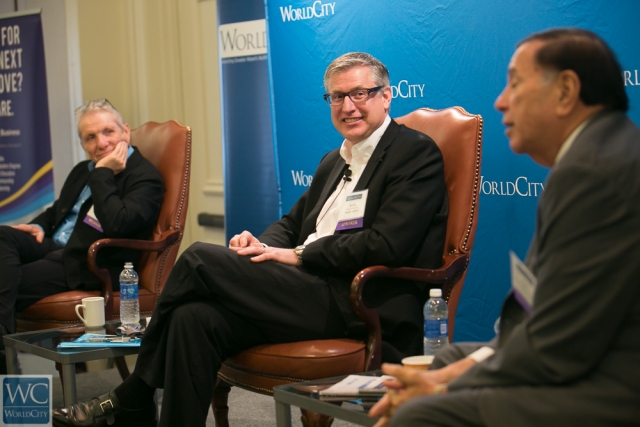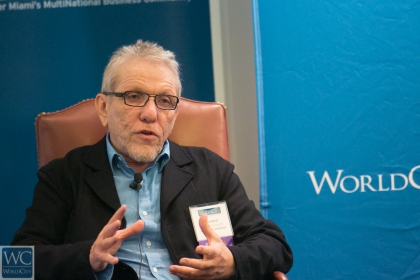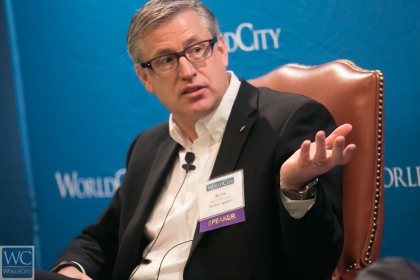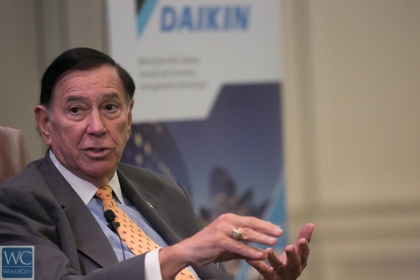Pursuing energy efficiency: 2nd annual Latin America Energy Forum
 With electricity used for more and more purposes, even for the “Internet of Things,” it’s increasingly important to pursue energy efficiency to stem pollution and reduce the need for new power plants.
With electricity used for more and more purposes, even for the “Internet of Things,” it’s increasingly important to pursue energy efficiency to stem pollution and reduce the need for new power plants.
But achieving energy efficiency is no easy task, panelists said Nov. 21 at WorldCity’s second annual Latin America Energy Forum.

Bernard Zyscovich, chief executive at Zyscovich Architects. Photos by Carlos Miller
“The issues of energy are going to end up being more political than technical,” said panelist Bernard Zyscovich, chief executive at Zyscovich Architects, a firm based in Miami with offices in Colombia. “There’s just an awful lot of money behind the status quo.”
Energy innovation: Design, Big Data, analytics and more
Today’s innovations in energy efficiency are truly amazing, panelists said at the Global Connections event.
Thanks to computers and Big Data, energy use in buildings can be monitored, and the information collected can be quickly deployed, sometimes allowing lights or air-conditioning to be adjusted automatically, said panelist Kevin Facinelli, executive vice president of operations at Daikin Applied Americas. Daikin is a leading global producer of air-conditioning systems.
Architects increasingly are designing structures with energy efficiency in mind too.
For example, the new terminal at Bogota airport in the Andes mountains of Colombia was designed to face north to receive plenty of sunlight, so electric light bulbs are not needed during the day, except in interior rooms. The building also was built to use the cool mountain air for most ventilation, said Zyscovich, whose team designed the project.
In finance, new public-private partnerships also are helping speed construction of state-of-the-art energy projects, both for traditional power plants and for wind, sun or other renewable energy ventures, said panelist Randy Avon, CEO of Asian Pacific Development Corp. His business development and investment banking firm is working on partnerships in Mexico, among other countries.
The partnerships generally involve a government granting a concession to a private group to build and operate a project, thereby allowing the country to develop key infrastructure without the nation taking on new sovereign debt, Avon said.
Who’s more likely to embrace energy efficiency?
Efficiency is especially important in Latin America, because electricity tends to be expensive – as much as five time the average U.S. price in some countries, said Facinelli.

Kevin Facinelli, executive vice president of operations at Daikin Applied Americas.
But not everyone is willing to invest upfront in efficient systems that save on electric bills long-term.
Institutional investors and governments tend to think longer-term and be more willing to spend money on sophisticated design and energy-saving equipment and sensors. They recognize that operational costs for a building can exceed initial costs seven or eight times over, said Zyscovich.
But some real-estate developers who sell condos and quickly flip them are more short-term minded, he said.
That’s why governments should regularly update building codes and mandate best practices, so that developers are required to meet new energy-efficiency standards, said Zyscovich.
Obtaining financing for new energy-efficient systems can be problematic. Often, financial institutions give a break on interest rates for proven technologies but charge more for new ones, said William Beilman, chief executive of Finexim International, which provides advice on project finance.
That’s why private-public partnerships are so important, said Avon. Multinational corporations developing major projects may offer more attractive terms for financing than other entities.
The importance of policy, as energy consumption rises
Across Latin America and worldwide, energy policies differ widely.
Argentina, for example, has such restrictive tariff rates that electric providers are loathe to invest, and blackouts are common in summer months as demand for electricity surges, said Nick Copeland, a managing director at GardaWorld.
“Are some countries in Latin America in danger of missing out on big opportunities?,” Copeland asked.
Politics matter, and those countries with restrictive markets that are leaning on China and Russia for funding have more limited opportunities to develop their energy infrastructure, said Avon.
Even U.S. states slow to open their markets to new energy options may fall behind, panelists said.
For example, Florida lags in offering incentives for solar on rooftops and other off-grid options that trim the need to build new power plants, said Zyscovich.

Randy Avon, CEO of Asian Pacific Development Corp.
And plans to bring transmission lines from Mexico into the U.S. work only in those states that have competitive energy markets such as Texas, Avon said.
The policy debate is vital now, because energy consumption is rising worldwide. Even with new efficiency measures, the world’s growing population is using more electricity overall. That’s becasue of new devices from smart-phones to tablets as well as the expansion of the middle class in emerging markets from China to Brazil.
“Regulation can be a carrot or a stick,” said Daikin’s Facinelli.
On the horizon: Net-positive buildings, the Internet of Things
In the next decade, the pace of innovation in energy efficiency may accelerate.
“The concept of the net-zero or net-positive building is becoming a reality,” said Facinelli. That refers to a building that can produce all the energy it needs, generally through solar panels and wind turbines, or one that can produce more energy than it uses, sending the excess electricity back into the grid.
The “Internet of Things” also is taking off, connecting machine to machine. For example, an electronic sensor can tell a digital thermostat to shut off heating when no one is inside that room, Facinelli added.
Still, energy-efficiency solutions will vary. In some poorer areas, for instance, it may make sense to limit investment in high-tech systems that require lots of outlays for maintenance.
It’s crucial to recognize that different cultures operate differently and be sensitive to those differences, said Zyscovich. “That’s an important part of not being the ugly American.”
Global Connections is one of six event series organized by media company WorldCity to bring together executives in greater Miami on international business topics. The Global series is sponsored by Florida International University’s school of business, public relations firm Edelman, real estate company Waterford at Blue Lagoon and air-conditioning maker Daikin.
The next Global Connections event is set for Jan. 29. It will feature the launch of WorldCity’s annual “Who’s Here” directory of multinational companies in Miami-Dade, Broward and Palm Beach counties. The directory lists more than 1,200 companies that have an office in South Florida and one outside the United States.